From child brides to business owners
Against the odds, Cambodia’s young women are reclaiming their futures, ditching housework – and sometimes their husbands too – to set up on their own as mechanics or beauty therapists.
In the far northern provinces of Cambodia, 3 young women are changing the narrative about what it means to be a girl with a dream.
Kanada, 24, grew up with motorbikes zooming past in the rain and sun along the bumpy village tracks. At the time, bikes were a man’s world. Now she fixes them.
“I don’t think motorcycle repair is just a job for boys. I’m a girl, I can fix things too.”
Kanada
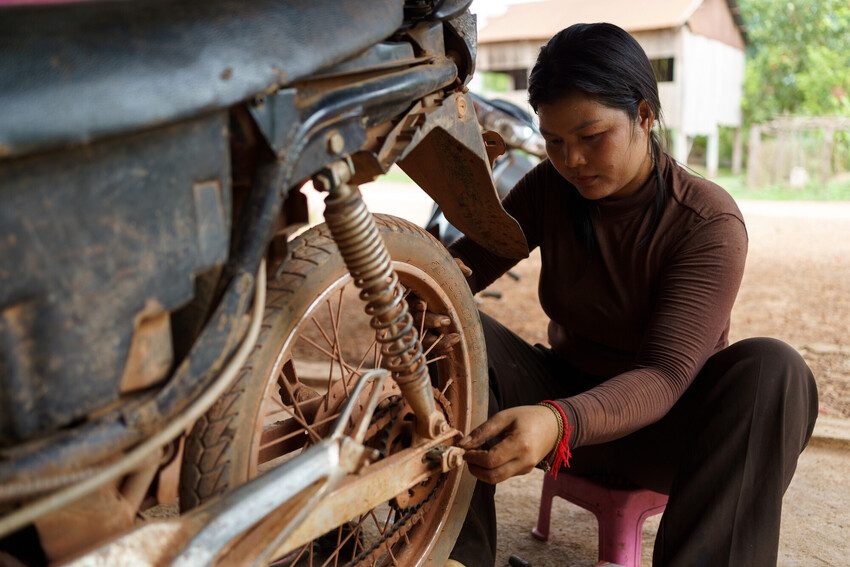
Photo: Kanada repairing a motorcycle at her workshop near her home. Photo credit: Thomas Cristofoletti
“I don’t think motorcycle repair is just a job for boys, girls can do it as well,” she says. “Even though I’m a girl, I can fix things too.”
Child marriage
In her blue and yellow overalls, smeared with grease and leaning over an engine block, it’s hard to imagine that a few years ago, Kanada was facing a more perilous situation.
Photo: Kanada during the motorcycle repair training course. Photo credit: Robert McKechnie, Plan International Australia
“I found out that I was going to be married,” she recalls. “When I was told, I didn’t feel very well.”
At the time, Kanada was 17.
“I wasn’t happy when they approached me to ask for my hand in marriage, because I was still very young. After we got married, we were both very afraid, because we didn’t know what to do for our future, or what kind of work we could do to support our lives.”
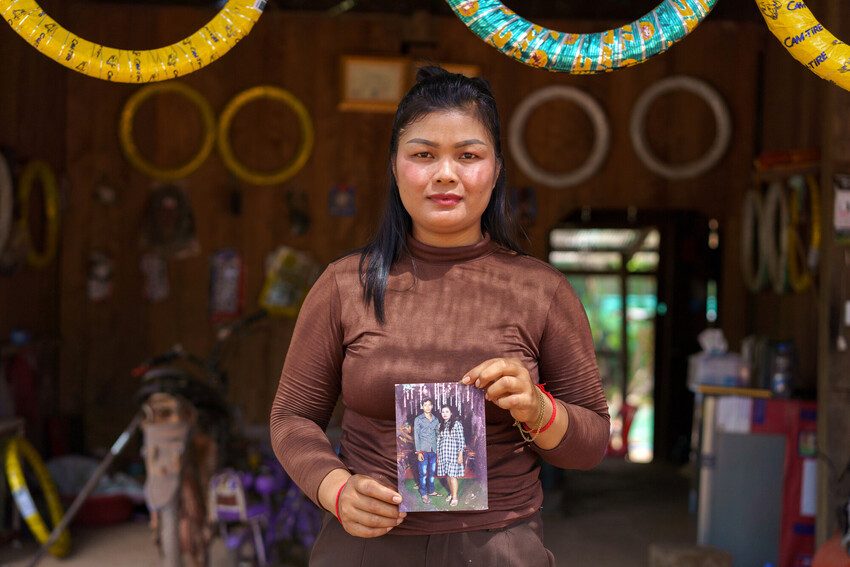
“I found out that I was going to be married. When I was told, I didn’t feel very well.”
Kanada
Photo: Kanada holding a photograph of her and husband when they were younger. Photo credit: Thomas Cristofoletti
Repairing motorbikes
Kanada heard about a motorcycle repair training course run by Plan International and decided to sign up.
“It felt like I was a blank sheet of paper entering a completely new environment, like a first grader starting school, I truly didn’t know a thing.”
She was the only woman on the course – including the instructor, who was also male.
Photo: Tools in Kanada’s garage. Photo credit: Thomas Cristofoletti
“When I faced those challenges, I encouraged myself by saying that I can do it. Even if the work is typically done by men, I was determined to give it my full effort.”
Kanada began dreaming of opening her own garage. Her husband stepped up, looking after the couple’s cows and buffalo, and caring for their children at home alone, so that she could attend the course.
“This new job has helped me become more confident,” says Kanada, “and understand myself better.”
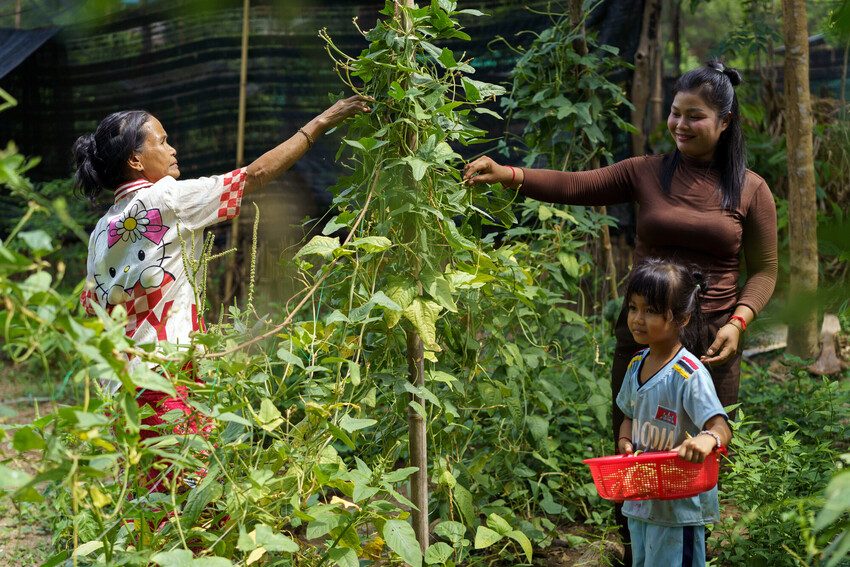
“I encouraged myself by saying that I can do it. Even if the work is typically done by men.
Kanada
Photo: Kanada with her mother and daughter, Manaka, 6. Photo credit: Thomas Cristofoletti
Her own business
Eventually, in the face of community resistance, but with the steadfast support of her husband, she opened her own garage.
“When I first opened my workshop, some people supported me, but others didn’t. They believed that, as a female repairer, I wouldn’t be able to do the job properly and they thought I should close the shop and do something else instead.”
“I feel very happy that I can earn my own income, because most importantly, it gives me a sense of independence. If I see someone broken down, I can help them.”
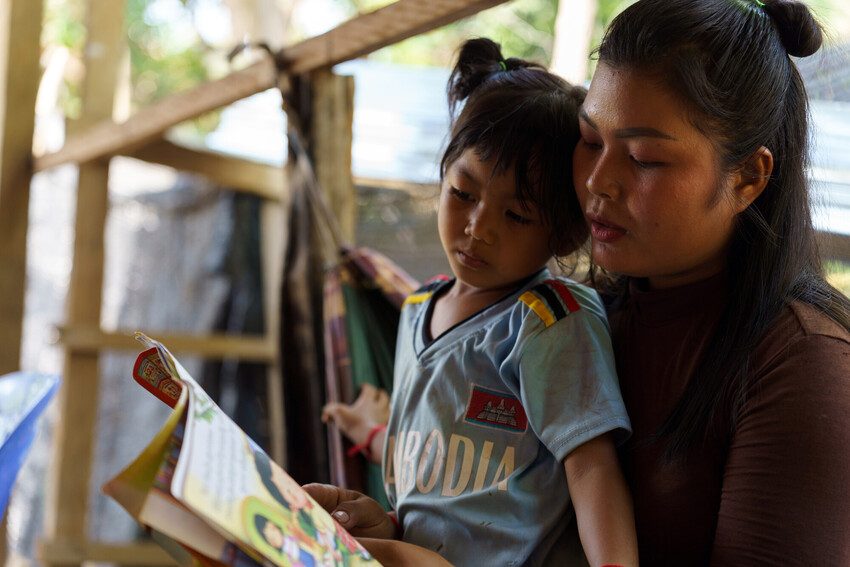
Choosing a different path after marriage
Pov, 24, married, but chose another path later on. “I got married at 16 years old,” Pov says. “I didn’t know how to make a living or how I should raise the children.”
After leaving school in Grade Two to work on the family farm, Pov’s prospects were limited, but when she heard of a salon training programme run by Plan International, she signed up. “I slept at school when I went to study salon,” she remembers. “There I learned how to style hair, paint nails, hairdressing, and makeup.”
Photo: Pov owns her own beauty salon in Ratanakiri Province, Cambodia. She has a six-year-old daughter with her husband, Pheap. Photo credit: Thomas Cristofoletti
Her determination came at a cost. “I often missed my children,” she admits. “Some people say that I abandon my husband and my children.”
Nonetheless, she kept going. “I feel happy because many customers support me. I am a hairstylist; I trust my skills because I have studied it clearly and I am able to provide for my family.”
“Don’t get married at a young age if you don’t have a job. Please have a job, finish your studies.”
Pov
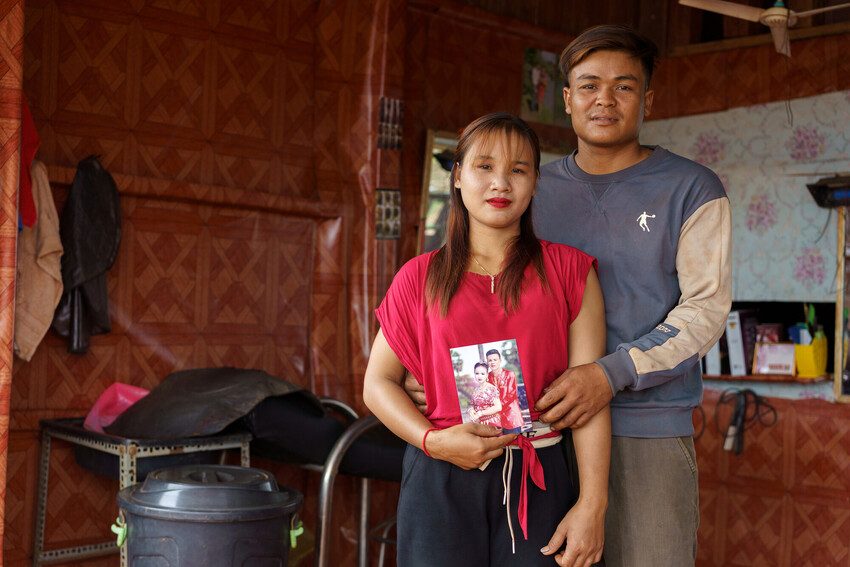
Photo: Pov with her husband, Pheap, 28. Photo credit: Thomas Cristofoletti
Now, Pov owns her own beauty salon, and is confident, creative, and vocal. “Don’t get married at a young age if you don’t have a job,” she says firmly. “Please have a job, finish your studies.”
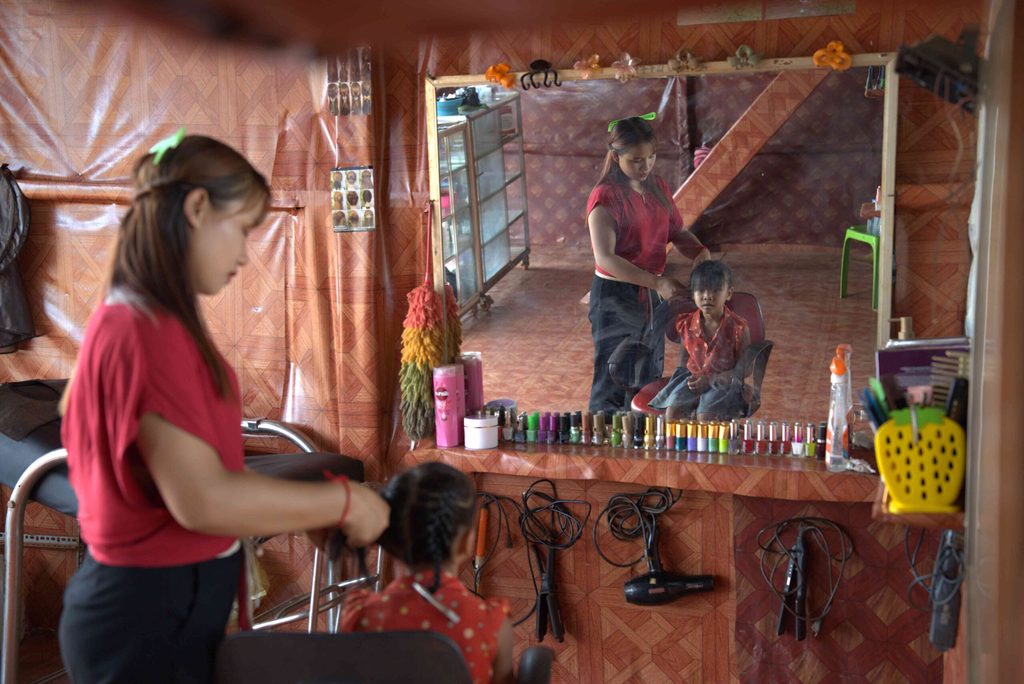
Early marriage
The girl-power message is echoed by Raty, 21, in neighbouring Stung Treng. Her story begins in the same way: early marriage, a baby at 17.
Raty describes herself as ‘blinded by love’ – she is one of the many girls in Cambodia who are not necessarily forced into marrying their boyfriends, but who choose love over education and independence.
“After getting married, we faced many obstacles and challenges,” she says. “We were still young, and marriage comes with many challenges.”
Eventually, Raty left. The couple divorced, and Raty and her son, who is 4, went to live with her parents. “After we separated, I decided to study when I heard that the Wathnakpheap Organisation was looking for students.”
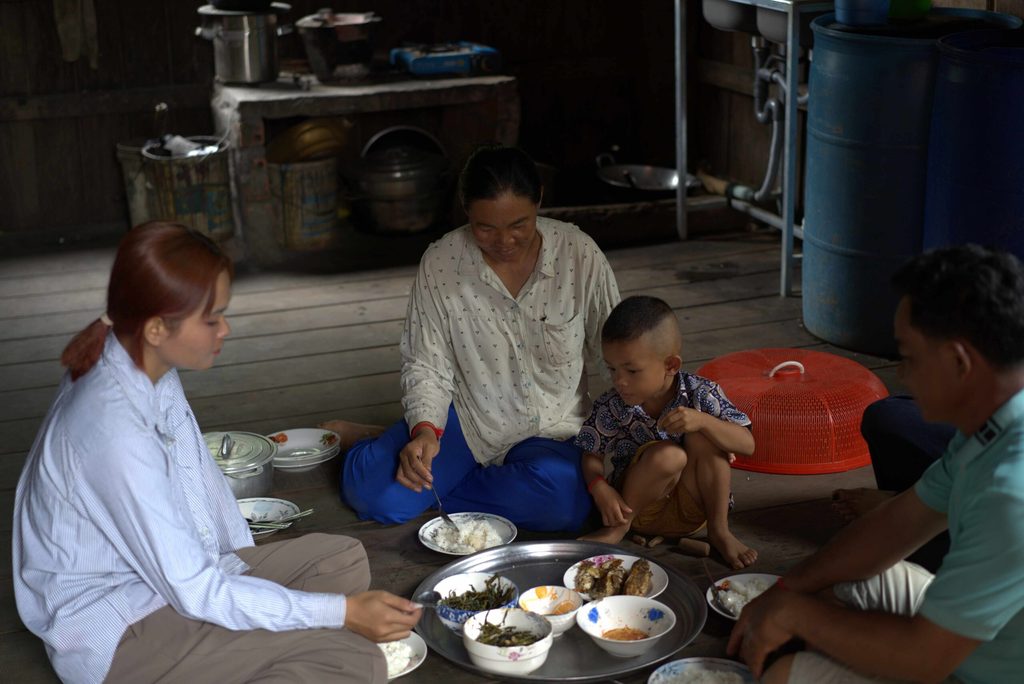
“Whenever I see a young couple, I tell them not to end up like me. I’ve already walked that path, so take me as an example.”
Raty
Photo: Raty with her parents and son. Photo credit: Thomas Cristofoletti
Raty trained in nail art, and was hired afterwards to teach others the same skills at a vocational school. “Nowadays, I have my own salon and can earn a living on my own, without having to rely on men,” she says. She pays her siblings’ tuition and supports her son, as well as mentoring other girls.
“At the time of my marriage, I didn’t know anything, but now I know how to style hair and take care of myself. I can stand on my own now.
“Whenever I see a young couple, I tell them not to end up like me. I’ve already walked that path, so take me as an example.”
Photo: Make-up from Raty’s kit. Photo credit: Thomas Cristofoletti
Raty is very clear about her advice to other young girls: “If I could turn back time, I would not have got married so early. Also, I would have many opportunities to go to school, follow my dream, and wouldn’t have to go through those problems.
“Nowadays, I can do what I want, because I have my own income.”
“I can do what I want, because I have my own income.”
Raty
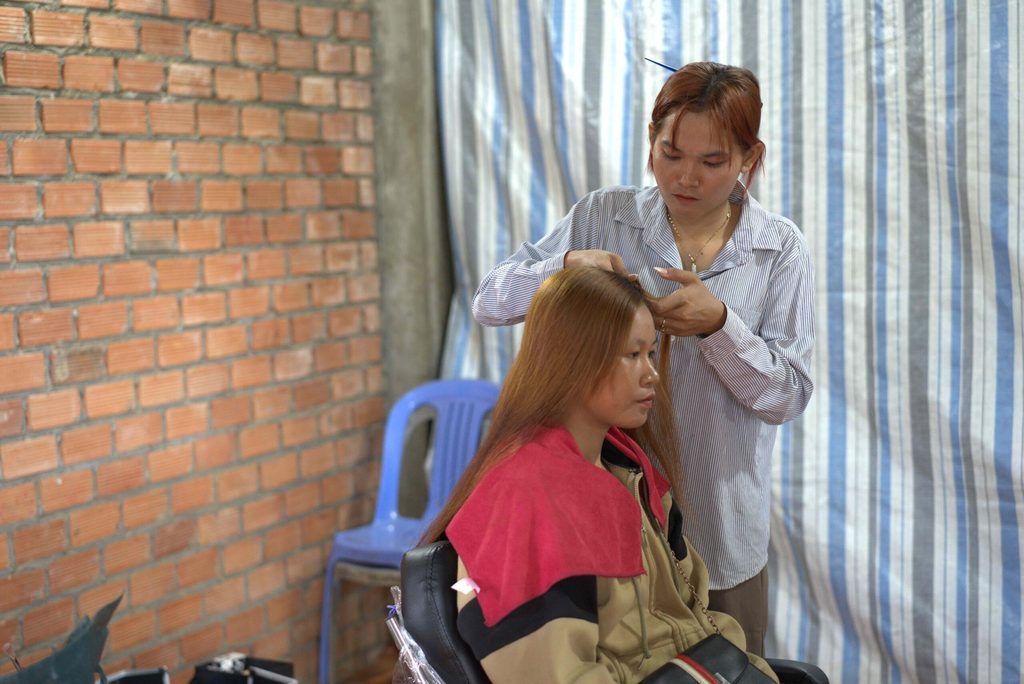
Photo: Raty doing a woman’s hair in her salon. Photo credit: Thomas Cristofoletti
The 3 women participated in Plan International’s Time To Act! and Stronger Actions! programmes, which work to prevent early marriage and promote girls’ skills, financial independence and education.
They do this through skills training, improved school environments that reduce drop-out rates and ensuring girls aged between 12 and 18 years have improved knowledge of their rights, gender-based violence, and how to protect themselves and others.
Photo: The interior of Kanada’s garage. Photo credit: Thomas Cristofoletti
Child marriage in Cambodia
Cambodia is home to over one million child brides and 1 in 5 young women were married in childhood. According to Unicef, 33% of women aged 20 to 24 report they were married or in a union before turning 18, and 8% before the age of 15.
The reality is more complex than girls being forced to marry by their families. Some make the choice themselves.
Such early unions often come at the cost of education: girls married young are far less likely to complete secondary school and more likely to become mothers early – 13% give birth before age 18, and 46% before age 20.
Their financial independence suffers too: just 40% of women married before 18 have a bank account, and fewer than half have held a job in the past year. Shockingly, nearly 4 in 10 have experienced intimate partner violence, and a significant number of women and men believe such violence is justified.
Let me be a child, not a wife
Hear the voices of 251 girls and young women from 15 countries as they share their personal stories of child marriage and its lasting impact in our new State of the World’s Girls research report.
Categories: Sexual and reproductive health and rights


